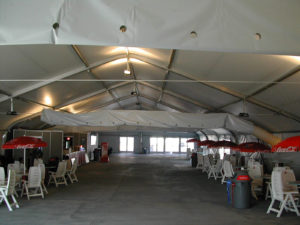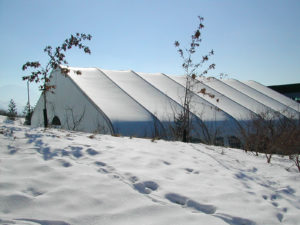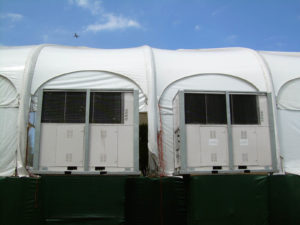 Tent and event professionals offer their expertise on extending the season, generating off-season revenue and managing year-round and seasonal employees.
Tent and event professionals offer their expertise on extending the season, generating off-season revenue and managing year-round and seasonal employees.
With the end of the year quickly approaching, many tent rental companies in the U.S. and Canada are preparing for winter and the off-season months. Now is the time to ask some important questions about how to creatively extend the season and make the best use of staff. Several industry leaders offer their expertise on maintaining profitability during the low season.
How do you use HVAC to extend your season in both directions (winter and summer)?
Newport Tent Co., based in Portsmouth, R.I., is surrounded by the Atlantic Ocean, which acts as a natural cooling unit so air conditioning is usually unnecessary.
“However, due to the ocean’s cooling effects, we use a lot of tent heaters for nine months of the year,” says owner Bill Corcoran. “From Sept. 15 to June 15, tent heaters are critical to our business. Without tent heaters, our season would be so short as to make it economically impossible to keep a year-round crew. With tent heaters, we are able to go year-round, and even with a foot of snow on the ground, we are able to create a tent environment inside that is 70 degrees and sunny.”
While warm weather and tented events seem to go together, temperatures that are too hot can also drive events indoors. Joe Peregman of Ocean Tents and Party Rentals, Mount Holly, N.J., suggests fans, evaporative air coolers and AC in the summer to encourage clients to opt for a tented event.
“Most homeowners do not find AC in their budgets, so the majority of this is used for high-end weddings and corporate events,” Peregman says. “Heat is much more affordable in colder months, so this is a popular option.”
What creative sales and marketing strategies help you generate off-season revenue?
Many party rental companies find that non-tent inventory can be a source of off-season income.
“We have focused our efforts on renting items during the winter months that complement indoor events,” says Mike Fitzwater of Special Events Entertainment and Rentals, Portsmouth, Va. “We offer casino party services as well as pipe and drape and audiovisual rentals.”
 Adams Rental and Sales, Hamilton, N.J., pursues tent sales, says owner David VanDenburgh.
Adams Rental and Sales, Hamilton, N.J., pursues tent sales, says owner David VanDenburgh.
“We recognize that selling sales is different than selling rental,” he says. “Decisions may require years to reach. [In addition] we’ve expanded our basic staging to include ancillary equipment and services such as sound amplification, audiovisual, choral risers, acoustical shells and custom draping. Demand for those products increases during the winter.”
How do you justify employee retention in the off-season?
Staffing is a challenge for any seasonal business, but especially for an industry that requires trained labor. Tent rental companies must balance the cost of year-round wages against the benefit of retaining experienced employees.
“We keep our 10 to 12 key guys all year because we don’t want to lose them,” says Michael Gould of Christian Party Rental, Hollis, N.H. “We lose about 25 college kids and seasonal workers in late August. September is tough since we are still very busy and don’t have enough help. Temps help some, but not enough. In the winter, the year-round guys clean and repair equipment.”
Fitzwater of Special Events Entertainment and Rentals also keeps valued employees on the payroll year-round.
“If I have an employee who is trained in our system and provides a long-term benefit to the company, I would rather pay that person through the slow time than try to find a replacement and retrain at the beginning of the season. I realize this costs me thousands of dollars each year, but I start the next season stronger.”
Do you provide tenting in the winter? If so, what best practices do you utilize to ensure this is a profitable venture?
Adam Ghrist of Windswept Entertainment and Events, Latrobe, Pa., says that when done correctly, winter tenting can be great, but when done incorrectly, it can be a disaster.
“Companies are often so eager to generate additional revenue in the slow winter months that they accept jobs they really shouldn’t be taking,” he says. “If a client wants to hold a tented event in the winter but doesn’t have the proper budget for the event, walk away! The small amount of revenue brought in from the event will never exceed the cost of a damaged reputation and damaged equipment.”
Newport Tent Co. provides tents in the winter—with some caveats. “We raise the price of winter tents by 50 percent, as winter setups really beat on your equipment,” Corcoran says. “Also, we will only supply white walls in winter. We will not supply clear plastic walls in the winter as they are very cold sensitive and crack and break when the temperature gets below freezing.”
If a customer of Ocean Tents and Party Rentals insists on clear walls or windows for a winter installation, Peregman requires the customer be liable if they crack. They also charge labor fees for most winter projects.
“Remember, jobs take twice the normal time to install in the cold or snow,” Peregman says.
How do you maximize your seasonal labor force, and what strategies do you use to keep them coming back year after year?
The best way to keep seasonal workers coming back year after year is to make sure the job is fun, Corcoran says.
 “If the crew has a lot of camaraderie and has a good time while getting the job done, they will come back the following year and they will recruit their friends to come with them,” he says. “To do this, don’t skimp on labor. Give the crew plenty of manpower to get the job done. If the crew is getting beat up every day because they are understaffed, they will be exhausted, unhappy and less productive. If they have plenty of manpower, they get done faster, they have more fun with the job and the customer gets to deal with a more pleasant and helpful crew.”
“If the crew has a lot of camaraderie and has a good time while getting the job done, they will come back the following year and they will recruit their friends to come with them,” he says. “To do this, don’t skimp on labor. Give the crew plenty of manpower to get the job done. If the crew is getting beat up every day because they are understaffed, they will be exhausted, unhappy and less productive. If they have plenty of manpower, they get done faster, they have more fun with the job and the customer gets to deal with a more pleasant and helpful crew.”
VanDenburgh of Adams Rental and Sales utilizes the H-2B visa program, which permits employers to hire foreign workers to come to the United States temporarily to perform seasonal, nonagricultural labor.
“Most of our workers return year after year, able to work legally in the U.S. for up to eight months,” he says. “The workers like to participate and we love having them.”
David Cesar of Blue Peak Tents Inc., West Chicago, Ill., recommends paying seasonal labor well and offering an incentive program to return.
“If the employees feel like they have nothing to strive for, they will always look elsewhere,” Cesar says. “We have different tiers of installers, each with different pay grades. Our guys have the opportunity to move up the chain, given that they complete the tasks necessary to do so and show the skills that are needed. We try to make it very black and white for our employees. We also give raises based on time worked at the company without any regard to skill.”
Advances in tent technology have helped to offset the challenges of the seasonality of tent rental. Combined with smart business practices, tent rental companies can thrive year-round.
By Eric Christensen, 888 298 8368; Brant McWilliams, +1 310 944 8712; and Michael Novosel, 866 451 8368; regional account managers, Aztec Tents.
 TEXTILES.ORG
TEXTILES.ORG


